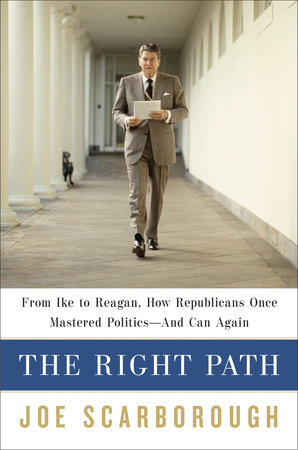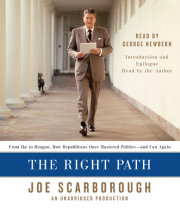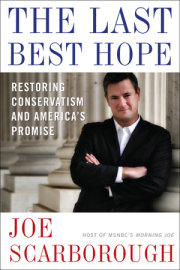1
A Dislike for Ike
“Should any political party attempt to abolish social security and eliminate labor laws and farm programs, you would not hear of that party again in our political history.”
—Dwight D. Eisenhower
“It stands athwart history, yelling Stop, at a time when no one is inclined to do so, or to have much patience with those who do.”
—William F. Buckley, Jr.,
in the inaugural issue of National Review, describing the mission of the magazine
IN THE AUTUMN OF 1951, THE WHITE HOUSE WAS UNDERGOING such extensive renovations—the first significant work to be done on the house in years—that Bess and Harry Truman had moved out, taking up residence across Pennsylvania Avenue at Blair House, the government’s guest quarters that had once been the home of Francis Preston Blair, Andrew Jackson’s confidential adviser. There President Truman sat down with General Dwight D. Eisenhower, then supreme commander of NATO forces in Europe, who was in Washington on official business.
Over lunch on this autumn Monday—it was November 5, almost precisely a year to the day before the ’52 election—the commander in chief had an offer for the visiting military hero. Should Eisenhower—the architect of Normandy, liberator of Western Europe—want it, Truman would “guarantee” the general the Democratic presidential nomination in 1952. Truman himself would step aside and vigorously campaign for the immensely popular Ike. It was not the first time Eisenhower had been approached with such a scenario. At Potsdam in 1945, shortly after Franklin Roosevelt’s death had catapulted Truman into the Oval Office, the new president had told Eisenhower, “General, there is nothing you may want that I won’t try to help you get. That definitely and specifically includes the presidency in 1948.” Eisenhower had essentially waved Truman off, saying, “Mr. President, I don’t know who will be your opponent for the presidency, but it will not be I.”
Now, a presidential cycle later, Truman was back, apparently hoping an Eisenhower campaign on the Democratic ticket would extend the party’s run well into the 1950s. At Blair House, however, Eisenhower again objected—but in different terms than he had at Potsdam.
“You can’t join a party just to run for office,” Eisenhower told Truman. In the privacy of the conversation with the president, Eisenhower said that he was not a Democrat but a Republican, and had been “all my life.” For Ike, running for president still seemed out of the question, but running as a Democrat was totally out of the question.
Ike’s protest raises an intriguing question all these years later: what did a man like Dwight Eisenhower mean when he declared himself to have been a Republican “all my life”? To be a Democrat in the Age of FDR obviously suggested support for New Deal programs and Roosevelt’s foreign policy. Though divided by disagreements over the scope of government, the Democrats were largely united by a sense that the state almost always had a significant national role to play. Roosevelt’s hold over Washington was the strongest of any president in U.S. history. From March of 1933 until his death a dozen springs later, FDR unleashed a blizzard of federal programs involving public works, Social Security, heavy spending, direct relief, farm aid, regulation of industry, banking restrictions, and a variety of new taxes that offended laissez-faire men all across America who shared Ike’s instinctive distrust of federal interference in free markets.
The nature of the pre-1950s Republicans is more elusive. While Democrats essentially agreed that government was at least a necessary evil, many Republicans who had come of age in the dozen years of GOP dominance from 1920 to 1932 were more likely to believe government was simply an evil. In 1934, a year into the New Deal, Republican senator Robert A. Taft of Ohio said this: “The measures undertaken by the Democratic Administration are alarming. Whatever may be said for them as emergency measures, their permanent incorporation into our system would practically abandon the whole theory of American government, and inaugurate in fact socialism.” The GOP in the FDR years was a coalition of free-enterprisers and protectionists as well as internationalists (largely in the East) and isolationists (largely in the Midwest). The GOP that languished in the minority under Roosevelt’s expansive vision of government was the ideological child of the 1920s president Calvin Coolidge, a leader who refused to provide federal aid to depressed farmers or check the more extreme economic elements of the Roaring Twenties. But the Grand Old Party dominated American politics in the years leading up to the Great Depression because, as the influential columnist Walter Lippmann observed in 1926, Coolidge Republicans had a talent for effectively doing nothing: “This active inactivity suits the mood and certain of the needs of the country admirably. It suits all the business interests which want to be let alone.… And it suits all those who have become convinced that government in this country has become dangerously complicated and top-heavy.” In other words there’s always been an antigovernment strain in American politics that waxes and wanes. It waxed in the 1920s and waned under FDR.
There were, of course, gradations of conviction and of intensity within the GOP. Eisenhower held more pragmatic views on economic and foreign policy than those advanced by Coolidge’s cool and aloof policies or Taft’s red-hot rhetoric. For a man like Eisenhower, Republicanism at home meant a belief in the power of free markets and the promotion of fiscal responsibility. Abroad, the Kansas soldier naturally belonged to the party’s more internationalist wing. As a military man he understood the importance of America’s involvement in the world, even though he was extremely cautious as president about the application of U.S. power.
Eisenhower was, in other words, part of the mainstream of the GOP of the 1930s and 1940s. After declining Truman’s offer of the Democratic presidential nomination, Ike publicly announced himself to be a Republican when he finally decided to seek the presidency in early 1952. After a heated primary struggle against Robert Taft, Eisenhower stormed to victory against Adlai Stevenson after twenty years of Democratic dominance. Ike would easily win the White House in two landslide victories under the GOP banner.
* * *
Despite returning Republicans to power after two aimless decades in the political wilderness, no Republican during his time was more resented within his own party than Dwight Eisenhower. William A. Rusher, the publisher of National Review, said “modern American conservatism largely organized itself during, and in explicit opposition to, the Eisenhower Administration.” And William F. Buckley’s 1955 declaration that National Review should stand athwart history yelling “Stop” was a primal scream from the right directed as much at the Republican president as at Ike’s Democratic opposition.
Why? How did Eisenhower, the man who led the Republicans back to power through the strength of his practiced charm and likability, become a source of conservative outrage? The story of Ike’s relatively quick journey from GOP standard-bearer to conservative scapegoat sheds light on the current Republican Party weakness of preferring ideological purity over the kind of principled conservative pragmatism that actually wins elections.
In the early 1950s the Republicans began a gradual but unmistakable shift from being a political institution that was a pragmatic collection of various factions to being an ideological institution that would, when at its very worst, choose nominees in state and national elections who could check every box required to advance an ideological agenda except one: winning. Political institutions reflect a diversity of views and interests and tend to be given to compromise. Ideological institutions, on the other hand, seek to embody a pure creed and ignore the harsh political realities that lay before them.
Like the Democratic Party of the 1970s and 1980s, this kind of descent into ideological extremism is less damaging in congressional races than in presidential races. Ideology is dramatic and seductive—but politics is about history and people and the messiness of the world. As William Buckley himself would say long after Ike left office, “Idealism is fine, but as it approaches reality, its costs become prohibitive.” Still, it’s easier to mobilize people around the clarity of ideas—adherence to doctrine—than around the virtues of compromise. The tension between ideology and principled pragmatism, still so important and even decisive in Republican politics in the first quarter of the twenty-first century, has its origins in the tensions between Dwight Eisenhower and the rising conservative movement.
I’m often frustrated when I try to explain to fellow Republicans how I can both agree with the most ideological of small-government conservatives while counseling them to strike tough bargains with more moderate members if compromise is the only way to move the conservative agenda forward. Like Reagan in the 1980s, Ike knew that he could often advance the Republican cause only by making deals with the congressional Democrats who ran Capitol Hill. That kind of pragmatic position repelled a younger Bill Buckley during the Eisenhower era, but an example of Buckley adopting the same stance a decade later was when he came rushing to the defense of newly elected California governor Ronald Reagan, then under attack from the right for passing big budgets and striking deals with Democratic lawmakers in Sacramento. Buckley would openly mock Reagan’s conservative critics who dared to challenge his new conservative champion, asking whether they would prefer he “padlock the state treasury and give speeches on the Liberty amendment?” (The Liberty Amendment was a right-wing favorite designed to limit the powers of the federal government drastically.)
Copyright © 2013 by Joe Scarborough. All rights reserved. No part of this excerpt may be reproduced or reprinted without permission in writing from the publisher.






